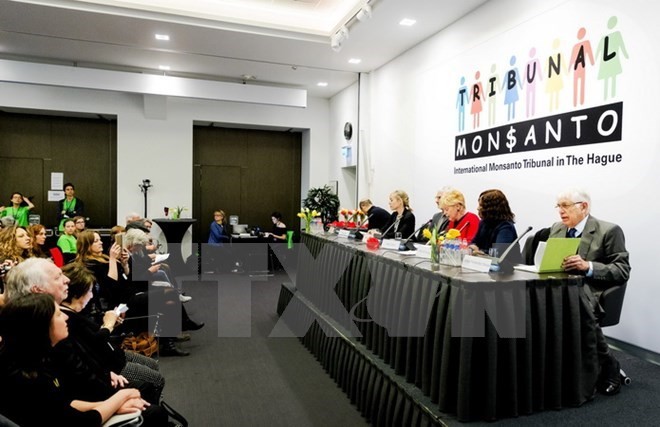(VOVworld) – After 6 months of investigation and a 2-day trial, the International Monsanto Tribunal in The Hague concluded that Monsanto has damaged the ecosystem and inflicted losses on the environment and people in many countries, including Vietnam during the American war. The ruling by the citizens’ tribunal adds weight to the public campaign to force Monsanto to abide by the law and accept responsibility for resolving the consequences of providing Agent Orange/Dioxin to the US army to carry out its campaign of chemical warfare in Vietnam.
 |
At the International Monsanto Tribunal's hearing on April 20 (Source: AFP/VNA)
|
The large-scale American chemical warfare in Vietnam inflicted heavy consequences on Vietnam’s people and environment. Between 1961 and1971, the American army sprayed nearly 80 million liters of toxic chemicals in Vietnam, 61% of which was Agent Orange containing a total of 366 kg of deadly dioxin. 4.8 million Vietnamese were exposed to the defoliant, and three million of them suffered severe physical harm. Hundreds of thousands of people died and those who survived have struggled ever since with tragic health consequences from the toxic exposure. Tens of thousands of people lost any chance of having healthy babies.
Resolving the consequences of Agent Orange/Dioxin involves locating and assessing dioxin residue in the soil, finding effective ways to disinfect the environment, treating the chronic health problems of the victims, and minimizing the transmission of birth defects to the next generation.
Vietnamese people ask for justice
Four decades after the war’s end, Vietnamese people are still calling on the world community to support their demand that the US accept responsibility for resolving the consequences of Agent Orange. On January 30, 2004, Vietnamese AO victims filed a lawsuit in the Brooklyn Federal Court in New York against 37 American chemical companies, including Monsanto, for producing and supplying toxic chemicals to the American army. The court’s rejection of the case provoked a backlash in many countries and even inside the US.
In May 2009, the International Tribunal of Conscience in Paris ruled that the American government used Agent Orange/Dioxin and its consequences could be considered environmental genocide, and that American companies were accomplices of the government. The Tribunal demanded that the US government and complicit chemical companies compensate Vietnamese victims and their families and take responsibility for detoxifying contaminated land and water resources.
Lawsuits by Vietnamese AO victims have not gained their objectives, but they have swayed public attitudes and have begun to see practical effects. In November 2006, Vietnam and the US issued a joint statement saying that both sides will exert greater efforts to clean up the environmental contamination near former Dioxin warehouses. The Ford Foundation and the Bill&Melinda Gates Foundation have financed projects to detoxify Da Nang airport, build bio-tech laboratories to find more effective ways to detoxify the environment, assess toxin exposure, and propose measures to reduce further exposure. The US Congress approved relief worth 3million USD per year from 2007 to 2009 and 15 million USD per year thereafter to resolve AO consequences in Vietnam. In 2011 it funded a 34-million-USD project to detoxify Da Nang airport. But much remains to be done.
Deputy Prime Minister Vu Duc Dam said every effort, whether material or spiritual, to clean up the land and support AO victims is invaluable. He said Vietnam welcomes the International Monsanto Tribunal’s decision and urges Monsanto to respect the Tribunal’s ruling by taking responsible action immediately.